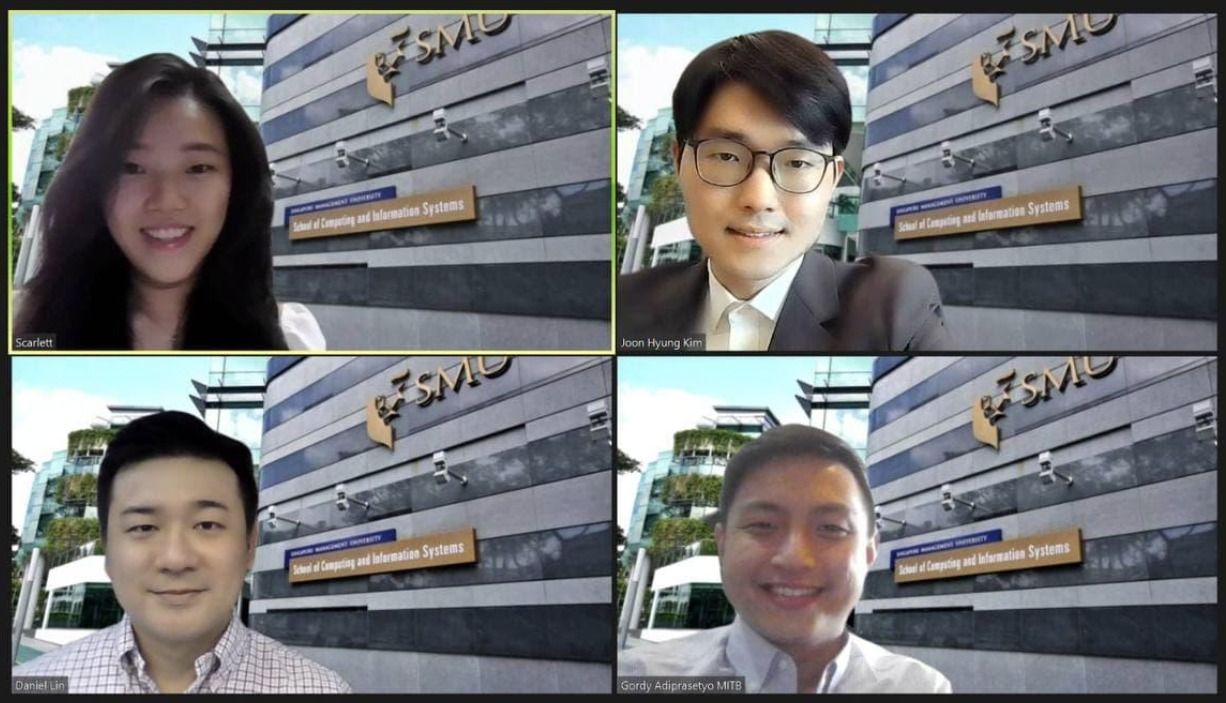
Second row (from left): Daniel Lin Yongyan, Gordy Adiprasetyo
SMU Master of IT in Business Team emerged as Grand Champions in the GLO-BUS Best Strategy Invitational
In May 2021, a team of four SMU Master of IT in Business (MITB) students emerged as Grand Champions in the GLO-BUS Best Strategy Invitational as Team ChampionsAtHeart. GLO-BUS is an online business strategy simulation adopted by more than 31,000 students across 261 universities in 29 countries. Teams were competing for superior global market leadership, superior financial performance, and sustainable competitive advantage.
Team ChampionsAtHeart, comprising Daniel Lin Yongyan, Gordy Adiprasetyo, Kim Joon Hyung, and Scarlett Yeh, was guided by Dr. Patrick Thng, SMU Senior Lecturer of Information Systems and Director of MITB (Financial Technology & Analytics) programme, as part of the Strategy and Organisation course. Through the course, the team was able to internalise and execute business strategy mechanisms into the simulation exercise.
Reflections by the Team:
SMU MITB's "Strategy & Organisation" course and the GLO-BUS competition have taught us many lessons, many of which would serve us well in our future endeavours. The following are some of them.
- Right Strategy
The importance of identifying a target segment for our products and crafting a viable strategy to create and sustain competitive advantage above our competitors. This was important for us as we were very clear on the decisions that we were going to take right from the start. Regardless of the immediate outcomes from initial rounds, we hung on to our strategic vision and pushed on. This helped us to reach the top few firms from being at the bottom due to our heavy initial investments in research and development (R&D) and subsequently reaping the benefits of those investments.
- Game Theory
Throughout the competition, our competitors were never once easy nor were they static in their business decisions. We had to adapt as a team to changing strategies made by our competitors and also apply Game Theory to anticipate their next move. Dynamic internal and external sensing was also required not just to focus on our planned strategy, but also to be sensitive enough to notice whenever competitors entered our strategic group to compete directly with us.
- Resilience
The competition helped to build and strengthen our mental resilience. This was crucial at the initial part of the competition, when we invested heavily in R&D and had to take a step back while our competitors went ahead. However, as we held on, our belief in our strategy eventually paid off.
The other moment when our nerves were tested was towards the end of the competition. We were the runner-up in the second and third last round. Though the competition was tight, the team was able to set a new pace within the industry by undertaking sound business risks to beat the competition in the final year, thereby capturing the championship position in the end.
In retrospect, the team said, “We are both humbled and honoured to have achieved the first position in the competition. It was tough to juggle between work and GLO-BUS but nonetheless, we celebrate our victory with humility as the competitors we faced were from reputed universities and they were very competent in the competition. We are honored to be given this opportunity to represent Singapore and SMU in this competition, and very glad to bring the championship home.”





Questions and Answers
- What was the competition about?
The GLO-BUS project is a business simulation game that first ran in 2008 and now involves over 250 universities in 28 countries. More than 30,000 students have participated in GLO-BUS. The Best Strategy Invitational takes place three times a year. Team ChampionsAtHeart was competing in the May 2021 invitational, having won the school round after competing against other teams from SMU.
- What did the competition involve? What was your project about and what did you hope to achieve with your project?
GLO-BUS is an online exercise where teams run companies racing for global market leadership in two product categories: wearable video cameras and camera-equipped copter drones. Our company competed head-to-head against rival companies that design, assemble, and market these same two products that are run by other members of the class. In every year of the simulation, we make decisions relating to product R&D, production operations and worker compensation, pricing and marketing, Corporate Social Responsibility, and financing of company operations.
- What skills and knowledge acquired from MITB have you applied in this competition? Please elaborate.
Business Strategy concepts—how businesses achieve and sustain competitive advantage as cost leaders, differentiators, or adopt the Blue Ocean Strategy. As we analysed the decisions made by the industry year by year, we also applied Game Theory concepts to predict and react against the actions of our competitors.
- Who were your team competing with? Where were the teams from?
10 other teams from other universities in Europe, United States, and Canada, who have performed locally and invited to the global competition.
- What was the judging criteria in selecting winners? Who were the judges?
Teams were assessed yearly against their competitors on five scoring variables: Earnings Per Share (EPS), Return on Average Equity (ROE), Stock Price, Credit Rating, and Image Rating. Performance on the five variables was measured using the Investor Expectations (IE) standard and Best-In-Industry (BII) standard. As the team that topped the table over ten years, Team ChampionsAtHeart emerged as the Grand Champions.
